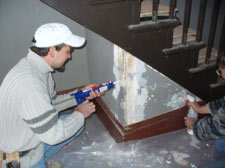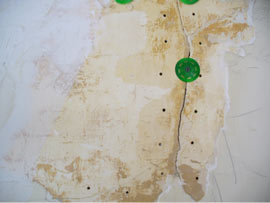![]() If you own an older pre-war house, you are likely to have plaster walls or ceilings. The operative word here is “older”, so you may have plaster repair high on your list of weekend projects. But what if you’re not the handyman-type, or the job is simply too involved to handle independently? In that case, you’ll need to hire a contractor to fix that cracked plaster wall or ceiling. Continue reading 6 Tips for Choosing a Contractor to Repair Plaster Walls and Ceilings
If you own an older pre-war house, you are likely to have plaster walls or ceilings. The operative word here is “older”, so you may have plaster repair high on your list of weekend projects. But what if you’re not the handyman-type, or the job is simply too involved to handle independently? In that case, you’ll need to hire a contractor to fix that cracked plaster wall or ceiling. Continue reading 6 Tips for Choosing a Contractor to Repair Plaster Walls and Ceilings
Author: megmcc
Stabilize, Then Beautify
This post is part 3 of a 3-post series.
Whenever you approach a plaster repair project, there are three crucial issues to keep in mind:
- The Building
- Beauty and Durability
- Stability
Last week we addressed issue #2, Beauty and Durability. This week we’ll discuss issue #3, Stability. Continue reading Stabilize, Then Beautify
How to Repair a Hole in a Plaster Wall: Part 3 – the Finish Coat
Recently, Rory was called to a circa 1900 home to repair a hole in a plaster wall. The hole was formed when a careless electrician used a sawzall to cut a space for a light switch. The vibration of the saw caused damage, resulting in an approximately 12 inch diameter hole that needed to be stabilized and filled in with new plaster. Continue reading How to Repair a Hole in a Plaster Wall: Part 3 – the Finish Coat
How to Comply with Renovation, Repair and Painting Rules
 We received a question recently from a customer about to start a renovation that involved plaster repair. He asked: “If a renovator disrupts 6 square feet or less of painted surface per room in several rooms inside one property, does the RRP Rule apply?”
We received a question recently from a customer about to start a renovation that involved plaster repair. He asked: “If a renovator disrupts 6 square feet or less of painted surface per room in several rooms inside one property, does the RRP Rule apply?”
First, some background. The RRP Rule is the Renovation, Repair and Painting Rule. It was issued by the Environmental Protection Agency in 2008 to help protect against the hazards of lead-based paint.
So, to answer your question: No, the rule does not apply in this plaster repair circumstance. The beautiful thing about using Plaster Magic®is that there is no demolition involved — you are adhering the damaged plaster back onto the wall rather than ripping it out and disturbing its pained sandwich. Continue reading How to Comply with Renovation, Repair and Painting Rules
The Building is your Client
This post is part 1 of a 3-part series.
Whenever you approach a plaster repair project, there are three crucial issues to keep in mind:
- The Building
- Beauty and Durability
- Stability
Today we’ll address issue #1: The Building. Continue reading The Building is your Client
How to Repair a Hole in a Plaster Wall: Part 1
A few weeks ago, Rory was called to a circa 1900 home to repair a hole in a plaster wall. The hole was formed when a careless electrician used a sawzall to cut a space for a light switch. The vibration of the saw caused damage, resulting in an approximately 12″ diameter hole that needed to be stabilized and filled in with new plaster. Continue reading How to Repair a Hole in a Plaster Wall: Part 1
Avoid Building Permits AND Preserve Historic Beauty
 Do you still need building permits if you’re repairing cracked plaster walls or ceilings? As long as you’re not doing any structural renovation, the answer is generally no, you do not building permits. Just ask Mike, a Plaster Magic® customer.
Do you still need building permits if you’re repairing cracked plaster walls or ceilings? As long as you’re not doing any structural renovation, the answer is generally no, you do not building permits. Just ask Mike, a Plaster Magic® customer.
We recently got an email from Mike, who had an interesting experience while on a plaster repair job in Boston. As if there aren’t enough reasons to preserve historic plaster instead of tearing it out and putting up drywall or new plaster… Continue reading Avoid Building Permits AND Preserve Historic Beauty
Beauty is Wall Deep
This post is part 2 of a 3-post series.
Whenever you approach a plaster repair project, there are three crucial issues to keep in mind:
- The Building
- Beauty and Durability
- Stability
Last week we addressed issue #1: The Building, and treating that building like you would a valued client. This week we’ll discuss issue #2, Beauty and Durability. Continue reading Beauty is Wall Deep
How to Repair a Hole in a Plaster Wall: Part 2 – Applying the Patching Plaster
The video below is part 2 of a 3-part video series. You can also watch Part 1: Stabilizing Lath and Plaster and Part 3: The Finish Coat.
Rory was called to a circa 1900 home to repair a hole in a plaster wall. The hole was formed when a careless electrician used a sawzall to cut a space for a light switch. The vibration of the saw caused damage, resulting in an approximately 12″diameter hole that needed to be stabilized and filled in with new plaster. Continue reading How to Repair a Hole in a Plaster Wall: Part 2 – Applying the Patching Plaster
The ”Scrape and Tape“
 We call this inferior method of plaster repair the “Scrape and Tape.” It is commonly deployed on a crack in a plaster wall or ceiling. The repairman uses a metal scraping tool, such as a paint scraper, to gouge a groove directly over the crack. He will then typically use drywall screws to secure the plaster around the crack to the lath. He then uses joint compound to fill in the groove, either with or without drywall tape or mesh, just as he would treat a seam on installed drywall.
We call this inferior method of plaster repair the “Scrape and Tape.” It is commonly deployed on a crack in a plaster wall or ceiling. The repairman uses a metal scraping tool, such as a paint scraper, to gouge a groove directly over the crack. He will then typically use drywall screws to secure the plaster around the crack to the lath. He then uses joint compound to fill in the groove, either with or without drywall tape or mesh, just as he would treat a seam on installed drywall.
“That sounds reasonable. Why is the ‘Scrape and Tape’ method wrong?” Continue reading The ”Scrape and Tape“
